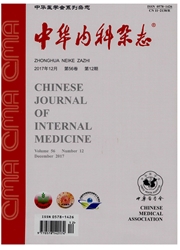

 中文摘要:
中文摘要:
目的对不同类型异基因造血干细胞移植(HSCT)的巨细胞病毒(CMV)感染患者采用统一的抢先治疗指征,比较抗病毒治疗的效果,从而评价抢先治疗策略的临床应用价值。方法进行异基因HSCT患者318例,自移植后采用实时定量(RQ)-PCR法监测血浆CMV—DNA水平,其中136例出现CMV感染,全相合HSCT31例,亲缘半相合HSCT88例,非血缘HSCT17例。三种类型移植采用相同的抗病毒抢先治疗指征,比较CMV—DNA拷贝数的转阴率、CMV病的发生率及患者的长期生存率。结果136例CMV感染患者分别采用更昔洛韦、膦甲酸钠或缬更昔洛韦进行抗病毒抢先治疗,全相合、半相合及非血缘移植组治疗的中位时间相近,三组患者CMV—DNA最终转阴率相似(96.8%,93.2%,88.2%),组间比较差异均无统计学意义(P〉0.05)。抢先治疗后三组患者发生CMV肺炎及肠炎的比例及死于CMV病几率的差异也无统计学意义(P〉0.05)。各类型移植患者的长期生存率差异无统计学意义(P=0.88),发生Ⅱ~Ⅳ度急性移植物抗宿主病(aGVHD)患者生存率明显低于0~Ⅰ度aGVHD患者(P=0.036)。结论不同类型造血干细胞移植术后的CMV感染患者,采用基于RQ-PCR监测的抢先治疗策略可达到相同的疗效。
 英文摘要:
英文摘要:
Objective Coherent preemptive therapy criterion was applied in various kinds of allogenic hematopoietic stem-cell transplant (allo-HSCT) recipients with cytomegalovirus (CMV) infection in order to evaluate its clinical value in various kinds of HSCT. Methods A total of 318 allo-HSCT patients were monitored for CMV infection. Real-time quantitative polymerase chain reaction (RQ-PCR) was performed to serially monitor CMV viremia after transplantation. There were 136 patients infected with CMV including 31 of HLA-matched sibling, 88 of HLA-mismatched related and 17 of unrelated donor HSCT. Coherent preemptive therapy criterion was employed. The clearance rate of DNAemia, incidence of CMV disease and overall survival rate were compared among the three types of HSCT. Results All the 136 patients with CMV DNAemia were treated with ganciclovir, foscamet and valganciclovir, respectively. The period of treatment and the clearance rate of DNAemia were comparable among the HLA-matched, HLA- mismatched related and unrelated donor HSCT groups ( 96. 8% , 93.2% and 88. 2% ) ( P 〉 0. 05 ). The incidence of CMV pneumonia and CMV enteritis and overall survival rate among the three groups were similar and there was no significant difference in the proportion of patients dying of CMV diseases ( P 〉 0.05 ). However, the overall survival rate of the patients with Ⅱ-Ⅳ acute graft-versus-host disease (aGVHD) was much lower than that of the patients with 0- Ⅰ aGVHD. Conclusion Similar curative effect can be observed when preemptive therapy is applied in various kinds of allo-HSCT recipients with eytomegalovirus infection based on the results of RQ-PCR.
 同期刊论文项目
同期刊论文项目
 同项目期刊论文
同项目期刊论文
 Effects of the NK cell recovery on outcomes of unmanipulated haploidentical blood and marrow transpl
Effects of the NK cell recovery on outcomes of unmanipulated haploidentical blood and marrow transpl Partially matched related donor transplantation can achieve outcomes comparable with unrelated donor
Partially matched related donor transplantation can achieve outcomes comparable with unrelated donor High CD4/CD8 ratio in allografts predicts adverse outcomes in unmanipulated HLA-mismatched/haploiden
High CD4/CD8 ratio in allografts predicts adverse outcomes in unmanipulated HLA-mismatched/haploiden First-line therapy for chronic graft-versus-host disease that includes low-dose methotrexate is asso
First-line therapy for chronic graft-versus-host disease that includes low-dose methotrexate is asso Expression profiles of adhesion molecules on na?ve T cells in bone marrow grafts of healthy donors t
Expression profiles of adhesion molecules on na?ve T cells in bone marrow grafts of healthy donors t Superior graft-versus-leukemia effect associated with transplantation of haploidentical compared wit
Superior graft-versus-leukemia effect associated with transplantation of haploidentical compared wit Expression of CD62L on donor CD4(+) T cells in allografts: correlation with graft-versus-host diseas
Expression of CD62L on donor CD4(+) T cells in allografts: correlation with graft-versus-host diseas Characterization of CD3+CD4-CD8- (double negative) T cells reconstitution in patients following hema
Characterization of CD3+CD4-CD8- (double negative) T cells reconstitution in patients following hema Administration of short-term immunosuppressive agents after DLI reduces the incidence of DLI-associa
Administration of short-term immunosuppressive agents after DLI reduces the incidence of DLI-associa Immune-related late-onset hemorrhagic cystitis post allogeneic hematopoietic stem cell transplantati
Immune-related late-onset hemorrhagic cystitis post allogeneic hematopoietic stem cell transplantati Graft-versus-leukemia effects of Wilms' tumor 1 protein-specific cytotoxic T lymphocytes in patients
Graft-versus-leukemia effects of Wilms' tumor 1 protein-specific cytotoxic T lymphocytes in patients The inferiority of G-PB to rhG-CSF-mobilized blood and marrow grafts as a stem cell source in patien
The inferiority of G-PB to rhG-CSF-mobilized blood and marrow grafts as a stem cell source in patien Conflicting impact of alloreactive NK cells on transplantation outcomes after haploidentical transpl
Conflicting impact of alloreactive NK cells on transplantation outcomes after haploidentical transpl Modified donor lymphocyte infusion (DLI) for the prophylaxis of leukemia relapse after hematopoietic
Modified donor lymphocyte infusion (DLI) for the prophylaxis of leukemia relapse after hematopoietic Platelet engraftment in patients with hematologic malignancies following unmanipulated haploidentica
Platelet engraftment in patients with hematologic malignancies following unmanipulated haploidentica Wilms' tumor gene 1 expression: an independent acute leukemia prognostic indicator following allogen
Wilms' tumor gene 1 expression: an independent acute leukemia prognostic indicator following allogen Immunomodulatory strategies for relapse after haploidentical hematopoietic stem cell transplantation
Immunomodulatory strategies for relapse after haploidentical hematopoietic stem cell transplantation Monitoring MRD with flow cytometry: an effective method to predict relapse for ALL patients after al
Monitoring MRD with flow cytometry: an effective method to predict relapse for ALL patients after al Treating donor mice with rhIL-11 and rhG-CSF promotes transplant-tolerance and preserves the effects
Treating donor mice with rhIL-11 and rhG-CSF promotes transplant-tolerance and preserves the effects The effect of HLA disparity on clinical outcome after HLA-haploidentical blood and marrow transplant
The effect of HLA disparity on clinical outcome after HLA-haploidentical blood and marrow transplant Unmanipulated HLA-mismatched/haploidentical blood and marrow hematopoietic stem cell transplantation
Unmanipulated HLA-mismatched/haploidentical blood and marrow hematopoietic stem cell transplantation Individualized Intervention Guided by BCR-ABL Transcript Levels after HLA-Identical Sibling Donor Tr
Individualized Intervention Guided by BCR-ABL Transcript Levels after HLA-Identical Sibling Donor Tr Basiliximab for the treatment of steroid-refractory acute graft-versus-host disease after unmanipula
Basiliximab for the treatment of steroid-refractory acute graft-versus-host disease after unmanipula Diarrhea during the Conditioning Regimen Is Correlated with the Occurrence of Severe Acute Graft-ver
Diarrhea during the Conditioning Regimen Is Correlated with the Occurrence of Severe Acute Graft-ver Influence of lymphocyte recovery on outcome of haploidentical transplantation for hematologic malign
Influence of lymphocyte recovery on outcome of haploidentical transplantation for hematologic malign Treatment of acute leukemia with unmanipulated HLA-mismatched/haploidentical blood and bone marrow t
Treatment of acute leukemia with unmanipulated HLA-mismatched/haploidentical blood and bone marrow t Haploidentical Hematopoietic Stem Cell Transplantation without In Vitro T Cell Depletion for Treatme
Haploidentical Hematopoietic Stem Cell Transplantation without In Vitro T Cell Depletion for Treatme Prolonged Thrombocytopenia Following Allogeneic Hematopoietic Stem Cell Transplantation and Its Asso
Prolonged Thrombocytopenia Following Allogeneic Hematopoietic Stem Cell Transplantation and Its Asso 期刊信息
期刊信息
